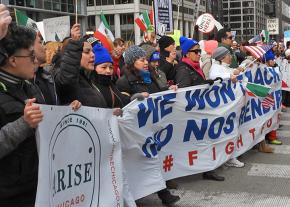An old message sent to a new president
Immigrants across the U.S. organized "Day Without Immigrants" actions on February 16, in opposition to stepped-up raids and deportations under the Trump administration. In city after city, immigrants stayed home from work and joined marches and protests. In New York, Chicago and Washington, D.C., some restaurant owners closed down in solidarity with the call for work stoppages, helping to generate further sympathy for the cause. In other places, however, employers retaliated with firings and suspensions of workers who stayed away.
In Milwaukee, 50,000 people marched on February 13 to protest the hundreds of people swept up in Immigration and Customs Enforcement (ICE) raids in the prior week--as well as the move by Milwaukee County Sheriff David Clarke to order his deputies to act as immigration agents in carrying out Trump's executive orders regarding immigration enforcement in interior U.S. cities.
Here, reports from Chicago on the demonstrations that brought out several thousand people on the "Day Without Immigrants."
THOUSANDS OF people rallied in Union Park, the historic site of Chicago's immigrant rights mega-marches in 2006, followed by a march to Federal Plaza as part of the February 16 "Day Without Immigrants" mobilization.
The crowd was overwhelmingly Latino, reflecting the fact that the demonstration was largely built through word of mouth in Chicago's Hispanic neighborhoods and through online social networks.
The march lacked any large, organized contingents since most people got to the demonstration on their own, arriving with co-workers, friends and classmates. Many said that they only learned of the mobilization in the days immediately leading up to the event.
Chatter about a national day of action for immigrant rights on February 16 had been circulating online for a few weeks, prompting Chicago resident Adán Rodríguez to post a video eight days before the event inviting people to join the action. The video quickly went viral, garnering more than 5 million views by the morning of February 16.

In his video, Rodríguez says that the action is a "direct message to the Trump administration that immigrants play a very important role in the economy of the nation...Without immigrants, the U.S. would be paralyzed, its economy greatly affected and many consumer products would become scarce."
Rodríguez then called on all immigrants, documented and undocumented, to participate in the action by "not going to work, not shopping, not buying gasoline, and not sending their kids to school that day."
On Monday, February 13, just three days before the action, there was still no formal call issued by any organization or group in Chicago, so no one had any clue about what to do other than to stay away from work, school and shopping.
At this point, a handful of small but dedicated labor and immigrant rights organizations--first, Arise Chicago Workers Center, and then, Chicago Community and Workers Rights, Organized Communities Against Deportations and Jobs with Justice Chicago--stepped in to make an official call for a march.
Once there was a focal point around which to organize, workers in the Latino neighborhoods of Pilsen and Little Village began calling on their employers to shutter their workplaces, or at least allow them to attend the march.
The results of these efforts were mixed, at least initially. Pete's Fresh Market, one of the area's largest grocery chains, threatened a seven-day suspension for any employee who missed work on February 16.
But when word of the store's plans for harsh retaliation spread, it sparked outrage throughout the community. After residents began calling the store and leaving angry posts on the company's Facebook page, management reversed itself and announced it would close five stores of its stores in the vicinity of Pilsen and Little Village. After that, practically the totality of the area's businesses followed suit.
"Day Without Immigrants" actions--which got their start more than 10 years ago during a mass upsurge against Republican-sponsored legislation to criminalize the undocumented--were originally intended to demonstrate the impact of immigrants on the U.S. economy, as consumers, but especially as workers.
So these actions have the feel of a strike combined with an economic boycott. It's notable that in contrast to the months and weeks of planning it took to accomplish this a decade ago, the February 16 action was organized with just a couple days of preparation.
The next step for the movement to demand dignity and respect for immigrants will be International Workers Day on May 1, and with more than nine weeks to get organized, these actions have the potential to be massive displays of resistance and solidarity.
¡Trump, escucha, estamos en la lucha!


